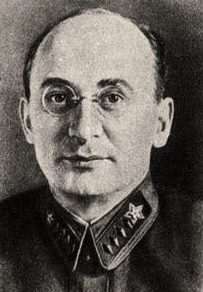
Back Lawrenti Beria Afrikaans لافرينتي بيريا Arabic لافرينتى بيريا ARZ Lavrenti Beriya Azerbaijani Берия Лаврентий Павлович Bashkir Lavrentėjos Berėjė BAT-SMG Лаўрэнцій Паўлавіч Берыя Byelorussian Лаўрэнці Берыя BE-X-OLD Лаврентий Берия Bulgarian Lavrenti Beria Breton
Lavrentiy Beria | |||||||||||||||||||||||||||||||||
|---|---|---|---|---|---|---|---|---|---|---|---|---|---|---|---|---|---|---|---|---|---|---|---|---|---|---|---|---|---|---|---|---|---|
| |||||||||||||||||||||||||||||||||
 Beria in 1939 | |||||||||||||||||||||||||||||||||
| First Deputy Chairman of the Council of Ministers | |||||||||||||||||||||||||||||||||
| In office 5 March – 26 June 1953 | |||||||||||||||||||||||||||||||||
| Premier | Georgy Malenkov | ||||||||||||||||||||||||||||||||
| Preceded by | Vyacheslav Molotov | ||||||||||||||||||||||||||||||||
| Succeeded by | Lazar Kaganovich | ||||||||||||||||||||||||||||||||
| Minister of Internal Affairs | |||||||||||||||||||||||||||||||||
| In office 5 March – 26 June 1953 | |||||||||||||||||||||||||||||||||
| Preceded by | Semyon Ignatyev | ||||||||||||||||||||||||||||||||
| Succeeded by | Sergei Kruglov | ||||||||||||||||||||||||||||||||
| People's Commissar for Internal Affairs | |||||||||||||||||||||||||||||||||
| In office 25 November 1938 – 15 January 1946 | |||||||||||||||||||||||||||||||||
| Preceded by | Nikolai Yezhov | ||||||||||||||||||||||||||||||||
| Succeeded by | Sergei Kruglov | ||||||||||||||||||||||||||||||||
| |||||||||||||||||||||||||||||||||
| Personal details | |||||||||||||||||||||||||||||||||
| Born | Lavrentiy Pavlovich Beria 29 March 1899 Merkheuli, Imperial Russia | ||||||||||||||||||||||||||||||||
| Died | 23 December 1953 (aged 54) Moscow, Soviet Union | ||||||||||||||||||||||||||||||||
| Cause of death | Execution by shooting | ||||||||||||||||||||||||||||||||
| Citizenship | Russian (1899–1917) Azerbaijani (1918–1920) Soviet (1920–1953) | ||||||||||||||||||||||||||||||||
| Political party | Communist Party of the Soviet Union (1917–1953) | ||||||||||||||||||||||||||||||||
| Spouse | Nina Gegechkori | ||||||||||||||||||||||||||||||||
| Parents |
| ||||||||||||||||||||||||||||||||
| Awards | Hero of Socialist Labour | ||||||||||||||||||||||||||||||||
| Signature |  | ||||||||||||||||||||||||||||||||
| Military service | |||||||||||||||||||||||||||||||||
| Branch/service | |||||||||||||||||||||||||||||||||
| Rank | |||||||||||||||||||||||||||||||||
| Wars | World War II | ||||||||||||||||||||||||||||||||
Lavrentiy Pavlovich Beria (/ˈbɛriə/ BERR-ee-ə; Russian: Лаврентий Павлович Берия, IPA: [lɐˈvrʲenʲtʲɪj ˈpavləvʲɪdʑ ˈbʲerʲɪjə]; Georgian: ლავრენტი ბერია, romanized: lavrent'i beria, IPA: [ˈɫavɾentʼi ˈbeɾia]; 29 March [O.S. 17 March] 1899 – 23 December 1953) was a Georgian Bolshevik and Soviet politician, Marshal of the Soviet Union and its state security administrator and chief, and chief of the People's Commissariat for Internal Affairs (NKVD) under Joseph Stalin during the Second World War, and promoted to deputy premier under Stalin in 1941. He officially joined the Politburo in 1946. Beria was the longest-serving and most influential of Stalin's secret police chiefs, wielding his most substantial influence during and after the war. Following the Soviet invasion of Poland in 1939, he was responsible for organising purges such as the Katyn massacre of 22,000 Polish officers and officials.[1]
He would later also orchestrate the forced upheaval of minorities from the Caucasus as head of the NKVD, an act that was declared genocidal by various scholars and, as concerning Chechens, in 2004 by the European Parliament.[2][3][4][5][6] He simultaneously administered vast sections of the Soviet state, and acted as the de facto Marshal of the Soviet Union in command of NKVD field units responsible for barrier troops and Soviet partisan intelligence and sabotage operations on the Eastern Front. Beria administered the expansion of the Gulag labour camps, and was primarily responsible for overseeing the secret detention facilities for scientists and engineers known as sharashkas. After the war, Beria oversaw the Soviet atomic bomb project, which Stalin gave absolute priority to, and the project was completed in under five years.[7]
After Stalin's death in March 1953, Beria became First Deputy Chairman of the Council of Ministers and head of the Ministry of Internal Affairs. In this dual capacity, he formed a troika with Georgy Malenkov and Vyacheslav Molotov that briefly led the country in Stalin's place. The Gulag system was transferred to the Ministry of Justice, and a mass release of over a million prisoners was announced. That amnesty led to a substantial increase in crime. A coup d'état by Nikita Khrushchev, with help from former Marshal of the Soviet Union Georgy Zhukov, removed Beria from power in June 1953. After being arrested, he was tried for treason and other offences, sentenced to death, and executed on 23 December 1953.
A sexual predator, Beria serially raped scores of girls and young women; there is evidence he murdered some of his victims.
- ^ Cite error: The named reference
8MNXZwas invoked but never defined (see the help page). - ^ Cite error: The named reference
Europarlwas invoked but never defined (see the help page). - ^ Courtois 2010, pp. 121–122.
- ^ Werth, Nicolas (2006). "The 'Chechen Problem': Handling an Awkward Legacy, 1918–1958". Contemporary European History. 15 (3): 347–366. doi:10.1017/S0960777306003365. S2CID 145083075.
- ^ Williams 2015, p. 67.
- ^ Jones, Adam (2016). Genocide: A Comprehensive Introduction (revised ed.). Routledge. p. 203. ISBN 978-1317533856.
- ^ Cite error: The named reference
US DOEwas invoked but never defined (see the help page).
© MMXXIII Rich X Search. We shall prevail. All rights reserved. Rich X Search